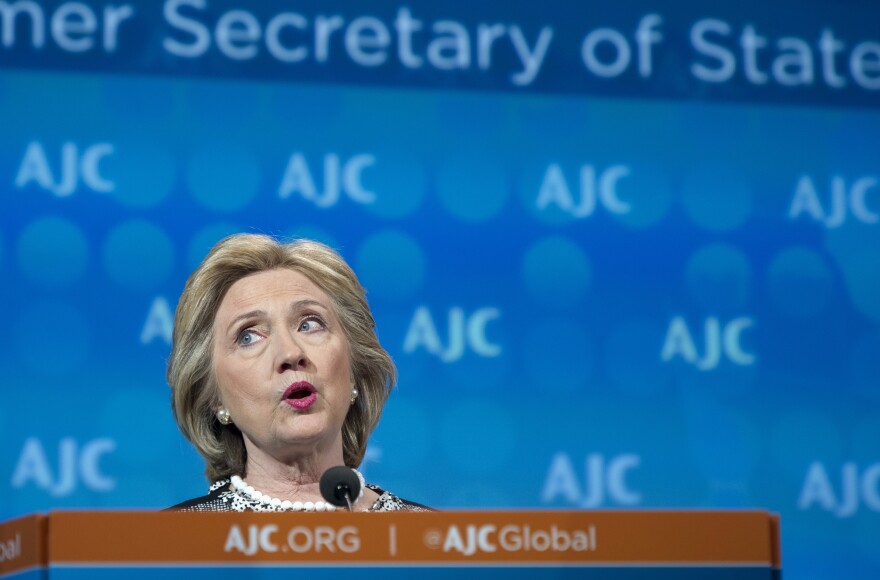To hear Hillary Clinton, the former secretary of state and once and maybe future Democratic presidential candidate tell it, her new book, Hard Choices, isn't the kickoff to a 2016 campaign.
She still hasn't made up her mind about another run for the presidency, she told Renee Montagne, co-host of NPR's Morning Edition. It's more a review of the decisions she made as the nation's top diplomat.
That the book looks backward is proof, she said, that it's not a campaign document because, echoing an often-used line of her husband, former President Bill Clinton, "I'm experienced enough to know that political campaigns are about the future, not the past."
But she acknowledged that the book tour gives her a chance "to work really hard to get out around the country to talk about what's on people's minds." In short, it sounds like she's embarking on another listening tour of the kind she used to launch her career in electoral politics in 1999 before she ran for a U.S. Senate seat from New York.
In any event, a review of her years traveling the globe as secretary of state during President Obama's first term gives her the chance to define her accomplishments even as her Republican critics ask, "What achievements?"
Here are some interview highlights:
Her accomplishments: To hear Clinton tell it, she helped rebuild the U.S. image in the world after the George W. Bush administration badly mangled it.
"The most important thing I did was to help restore America's leadership in the world. And I think that was a very important accomplishment. We were flat on our back when I walked in there the first time.
"We were viewed as being untrustworthy, as violating our moral rules and values, as being economically hobbled. And we had to get out there and once again promote American values and pursue our interests and protect national security. Because of the eight years that preceded us — it was the economic collapse, it was two wars, it was the war on terror that led to some very unfortunate, un-American actions being taken. That was my biggest challenge. It was why the president asked me to be secretary of state."
Little daylight between her and Obama: "On practically everything, the president and I agreed. Syria was an exception. As I say in the book, there are reasons why I thought it was wise to support the moderates as they were trying to demonstrate for greater freedom against [Syrian President Bashar] Assad. But it's the president's call. I'm an absolute believer that the buck does stop, as Harry Truman said, on the president's desk."
She sought a tougher Bergdahl deal: "During the time that I was there, we were trying to put together a much bigger deal, a deal that would get the Afghan government talking face to face with the Taliban, to try to resolve some of the points of controversy that exists between them. Whether the Taliban would forswear violence. Whether they would be integrated into Afghan society. Whether they would renounce their relationship with al-Qaida, which is what got them into this mess in the first place. ... It was a tougher deal, and it was a very difficult preliminary discussion. All through the calculations we were making, we had to get Bergdahl back. That was an absolute condition for us. Of course, they're not just going to sit there and say, 'OK, we'll do all this.' They wanted their five prisoners back from Guantanamo. And we had a lot of conditions we wanted met before we could even approach that: timing, and what were called confidence-building measures. ... I left, and I'm not going to second-guess the decision that was made. As I understand, it was a decision backed by the State Department, the Defense Department and the intelligence community."
The lessons of Benghazi: "We have to keep learning. What can we do to protect Americans, particularly, from my perspective, our diplomats and development experts? They don't go armed into these places that are dangerous. They don't have a military contingent to back them up. They are there representing the United States. And some would say, 'We shouldn't be in dangerous places.' Well, there are so many dangerous places in the world right now that that would eliminate a lot of the important work that America needs to be doing. And it's just not in our DNA. We're not the kind of place that retreats in the face of danger. We need to be prudent and take necessary precautions. But we need to be present."
The reset with Russia worked — until Vladimir Putin ruined it: Clinton claimed three successes from the reset of relations with Russia that occurred during the presidency of Dmitry Medvedev — an arms reduction treaty, Russian help to slow Iranian progress toward nuclear weapons, and Russian agreement to let Americans transport war materiel needed by U.S. troops in Afghanistan across Russian territory.
But once Putin re-emerged from behind the curtain, she suggested, the reset essentially ended.
"Once Putin decided to take back the presidency and that Medvedev was out, because he was who we dealt with during that period, things began to change. We always have to stand our ground and stand up for our values. I took Putin on very early when I criticized the parliamentary elections that were held in 2011 as being irregular. Apparently thousands of Russians thought that because they poured into the streets. And then Putin accused me of inciting riots in Russia, which was so unfair to the Russians who just wanted to stand up for their own rights and their hope for a democracy.
"And as I watched him, I sent two memos to the president, saying that, 'Look, we have to deal with him differently.' Because he was always the power behind the throne, so to speak. But Medvedev was interested in a different relationship and was more forthcoming."
Copyright 2021 NPR. To see more, visit https://www.npr.org.




